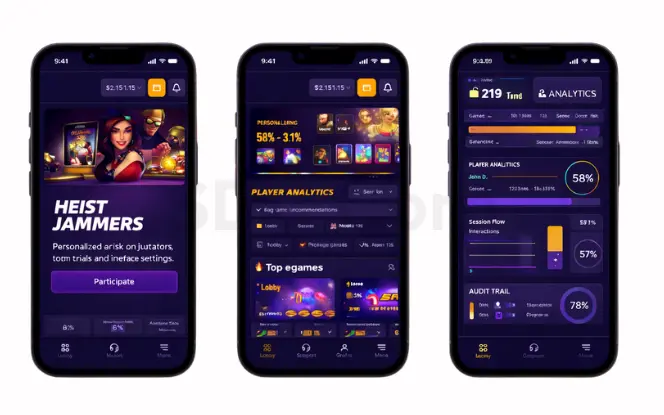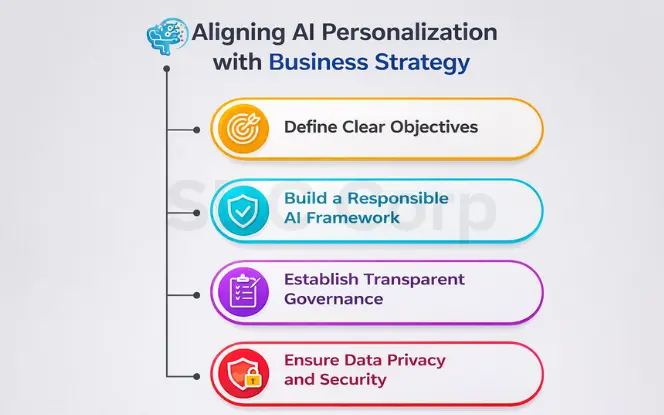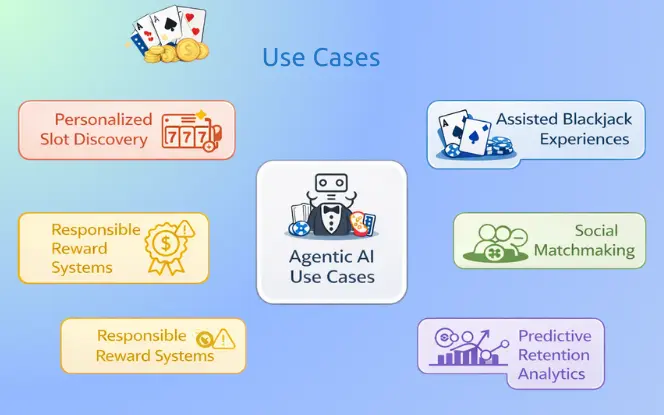Artificial Intelligence is changing how online casinos design games. Instead of fixed gameplay, platforms now adjust mechanics in real time based on player behavior. This makes games more responsive and aligned with player expectations. AI-driven personalization is now essential in iGaming. It supports game balance, rewards, player support, and session flow using live data. This blog explains how AI enables personalized casino game mechanics, covering implementation, challenges, and real-world results.
Benefits of AI-Personalized Casino Gaming

For Players
AI personalization creates a more intuitive, transparent, and enjoyable experience:
- Relevant game recommendations based on preferences and play style
- Personalized onboarding, tutorials, and interface settings
- Contextual insights and reminders that support informed decision-making
- Greater trust through consistent, predictable, and fair systems
Important: Personalization enhances the experience without altering game odds, RNG outcomes, or certified mechanics.
For Casino Operators
Operators benefit from AI-driven personalization through measurable business improvements:
- Increased engagement via better game discovery and session flow
- Higher conversion and retention through targeted, compliant promotions
- Early identification of churn risk using predictive analytics
- Reduced operational costs through AI-powered customer support
For Casino Operators
AI personalization also strengthens regulatory oversight:
- Continuous monitoring for fairness and rule adherence
- Built-in responsible gaming controls and alerts
- Transparent audit trails generated from AI-driven systems
Key Challenges in AI-Powered Personalization

Data Privacy and Regulation
AI systems in online casinos process sensitive personal and financial information, making regulatory compliance a core requirement rather than an option
- Casinos must comply with GDPR, CCPA, and jurisdiction-specific gaming laws
- Secure data handling and consent management are mandatory
- Poor governance can lead to fines, licensing risks, and loss of player trust
Behavioral Signal Interpretation
Personalization engines rely heavily on behavioral data to tailor experiences without using intrusive technologies.
- AI analyzes betting patterns, session duration, and interaction speed
- Facial or voice recognition is generally avoided for privacy reasons
- Misinterpreting behavioral signals can lead to irrelevant or harmful personalization
Ethical and Responsible Gaming Concerns
AI-driven personalization must prioritize player well-being and ethical standards over engagement optimization.
- Systems should not encourage excessive play or loss chasing
- Safeguards must be in place to protect vulnerable users
- Responsible gaming principles must outweigh revenue-driven metrics
Technical Complexity
Implementing AI personalization requires advanced infrastructure capable of handling scale, integration, and compliance simultaneously.
- Real-time data processing pipelines are essential
- Integration with game engines and CRM systems must be seamless
- Performance consistency across devices is critical
Real-Time Performance Demands
Casino platforms operate in high-speed environments where even minor delays can impact user experience.
- AI decisions must be delivered within milliseconds
- Personalization should never disrupt gameplay or platform stability
- Accuracy and speed must be balanced without compromising reliability
Also read: What is a mobile casino?
Aligning AI Personalization with Business Strategy

Define Clear Objectives
- Improve retention
- Enhance responsible gaming outcomes
- Optimize support efficiency Improve player lifetime value
Build a Responsible AI Framework
A responsible AI framework ensures personalization remains ethical, transparent, and user-centric.
- Implement bias detection and regular testing
- Offer opt-out options for personalization
- Clearly explain how AI influences player experiences
Establish Transparent Governance
Strong governance ensures accountability, compliance, and long-term scalability of AI systems.
- Define data collection and usage policies
- Set access control and accountability standards
- Establish data retention and deletion rules
Invest in Player Trust
Trust-focused AI empowers players while supporting long-term engagement and loyalty.
- Provide session reminders and spending limits
- Enable self-exclusion and safety controls
- Promote clarity, control, and player protection
How to Implement AI in Casino Game Mechanics

Step 1: Data Collection & Preparation
- Gameplay logs and interaction patterns
- Transaction history
- Session duration and frequency
- Behavioral signals (e.g., bet changes, navigation speed)
- Demographic data where legally permitted
Step 2: Train Machine Learning Models
- Predictive analytics for churn and engagement
- NLP for customer support chatbots
- Anomaly detection for responsible gaming monitoring
Step 3: Create Adaptive Experience Systems
- Game recommendations and table selection
- Tutorials, tips, and UI preferences
- Session pacing and reminders Visual themes and accessibility settings
- Certified RNG outcomes, RTP, and dealing rules remain unchanged.
Step 4: Personalize Offers and Bonuses
- Preference-based promotions
- Seasonal and loyalty-driven rewards
- Clear eligibility rules and bonus caps
- Responsible bonus frequency controls
Step 5: Enable Smart Support Systems
- AI chatbots handle routine queries efficiently
- Sentiment analysis escalates complex issues to human agents
- Automated alerts support responsible gaming interventions
Step 6: Continuous Testing and Optimization
- A/B testing of UX personalization
- Measure engagement, satisfaction, and safety metrics
- Iterate responsibly using data-driven insights
Know more about: How online casino payout works
Real-World Use Cases

Personalized Slot Discovery
AI helps players discover slot games that align with their preferences without altering game mechanics.
- Recommends slots based on volatility preference, themes, and session behavior
- Does not modify RTP, odds, or outcomes
- Improves discovery while maintaining certified game fairness
Assisted Blackjack Experiences
AI enhances understanding and comfort without interfering with gameplay rules.
- Provides rule explanations and strategy guidance
- Suggests suitable tables based on experience level
- Preserves fixed dealer rules and certified game logic
Responsible Reward Systems
Loyalty programs can be optimized to reward healthy engagement rather than risky behavior.
- Rewards based on tenure and engagement, not losses
- Integrates reminders, limits, and responsible gaming tools
- Encourages sustainable, long-term participation
Social Matchmaking
- Matches players by skill level or play style
- Reduces mismatched or unbalanced gameplay
- Enhances fairness and social engagement
Predictive Retention Analytics
AI identifies early signs of disengagement to improve experience—not apply pressure.
- Detects churn risk using behavioral trends
- Improves content discovery and support experiences
- Avoids pressure-driven incentives or exploitative tactics
Additional Strategic Enhancements

Procedural Content Generation (PCG)
AI-driven content generation increases variety and immersion while preserving certified game mechanics.
- Generates themes, environments, and narratives dynamically
- Enhances freshness and replay value
- Does not alter game logic, RTP, or outcomes
Behavior-Based Responsible Gaming
AI proactively supports player well-being by identifying early risk signals.
- Detects prolonged sessions or rapid wagering patterns
- Suggests breaks, limits, or cooldowns in real time
- Reinforces responsible gaming without disrupting experience
Voice and Accessibility Features
AI improves inclusivity by enabling alternative interaction methods.
- Supports voice navigation and AI assistants
- Enhances usability for visually impaired or hands-free users
- Particularly effective on mobile and VR platforms
VR and AR Personalization
In immersive environments, AI adapts experiences to individual comfort levels.
- Customizes surroundings, soundscapes, and interaction pacing
- Reduces sensory overload in VR and AR experiences
- Improves immersion while maintaining player comfort
Data Privacy and Security in AI-Personalized Casino Gaming
AI-powered casinos rely on large volumes of behavioral data to deliver personalization. Protecting this data is essential.
Regulatory Compliance: Adherence to GDPR, CCPA, and gaming authority requirements
Transparency: Clear communication about data usage and player rights
Data Security: Encryption, secure storage, and strict access controls
Ethical Data Handling: Collect only necessary data and anonymize wherever possible
The Future of AI in Casino Game Mechanics
AI in VR and AR Casinos
AI will enhance immersive casino environments by adapting experiences in real time while prioritizing comfort and safety.
- Real-time adaptation of immersive environments
- Personalized interaction pacing and visual themes
- Deeper engagement without compromising player safety
AI in Live Dealer Games
AI will support live dealer formats by improving discovery, interaction, and oversight.
- Smarter game discovery and table recommendations
- Enhanced player–dealer interaction tools
- Improved moderation and fairness monitoring
Looking Ahead
Future AI advancements will emphasize precision, integration, and responsible design.
- More accurate behavioral predictions
- Integration with wearables and haptic technologies
- Stronger focus on automated responsible gaming safeguards
Conclusion
AI is no longer just a feature in casino platforms—it is a strategic advantage shaping safer, smarter, and more engaging gaming experiences. From real-time personalization and adaptive gameplay to ethical safeguards, AI helps operators better understand players while maintaining fairness and compliance. SDLC Corp play a critical role in this evolution by delivering scalable, secure, and regulation-ready AI solutions across iGaming verticals, including innovations such as artificial intelligence lottery software, where accuracy, fairness, and instant decision-making are essential. As competition grows, the future of casino gaming will belong to platforms that combine deep player intelligence with responsible, adaptive AI systems.
FAQ's
What is AI personalization in casino gaming?
How does AI improve player engagement?
What benefits do operators gain from AI?
. How does AI support responsible gaming?
Can SDLC CORP handle end-to-end development?
Yes, SDLC CORP handles end-to-end development, from concept to deployment. We cover design, coding, testing, and post-launch support for complete project delivery.
Does SDLC CORP provide ongoing support after project deployment?
Custom Software Development Cost: Key Drivers & Pricing
Understand what impacts pricing, typical cost ranges, and how to plan a realistic software budget without guesswork.





